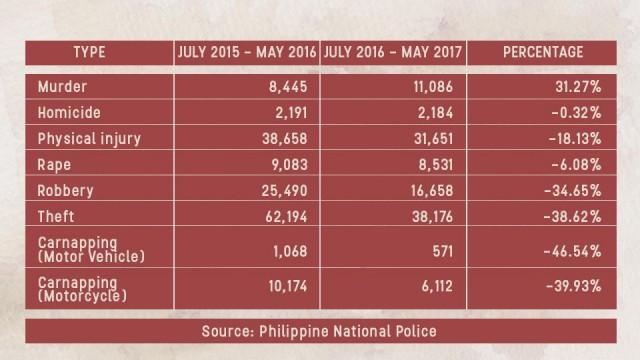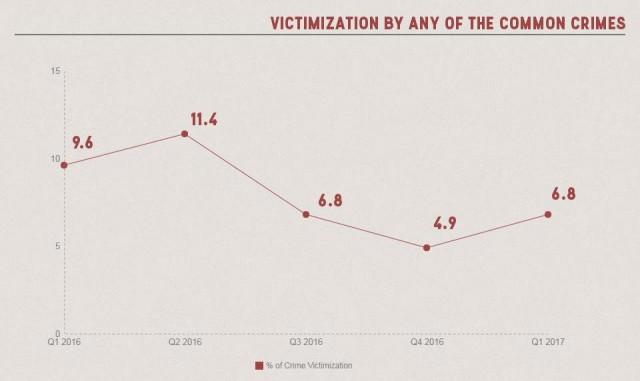PNP data shows number of crimes down 10 percent
It was the centerpiece of his campaign platform. Then presidential candidate Rodrigo Duterte vowed to stop crime, drugs and corruption within three to six months after election into office.
“If I become President, it would be bloody because I will order the killing of all criminals, ang mga durogista at drug lords,” Duterte said during the Mindanao leg of Comelec’s PiliPinas Presidential Debates in February 2016.
More than two months into his presidency, Duterte sought an extension of another six months on his self-imposed deadline.
“I did not realize how severe and how serious the problem of drug menace in this Republic until I became President,” he said on September 18, in his speech on the release of Norwegian hostage Kjartan Sekkingstad.
While crime and illegal drugs still persist a year into the presidency, Duterte was able to bring down the number of crimes by 10 percent in the first 11 months of his administration, data from the Philippine National Police show.
During the last quarter of 2016, or within the first six months of his presidency, the Duterte administration also obtained a new quarterly record low in crime victimization since 1989.
The Social Weather Stations survey on crime victimization released in January 2017 showed that 4.9 percent of families said they were recently victimized by any crime.
But the decrease in crimes came at a price: a rising death toll on alleged criminals. Murder cases rose by more than 31 percent in the last 11 months, PNP data show.
Police figures indicate that a 17 percent of murder and homicide cases were related to illegal drugs, a scourge that Duterte aims to eradicate through a relentless nationwide campaign.
There have been more than 5,000 drug-related deaths since the start of the Duterte administration, data from government agencies show. These include those who died in police operations and those whose murders or homicides were determined upon investigation to be drug-related.
Edna Co, professor of the University of the Philippines National College of Public Administration and Governance, said the mounting body count from Duterte’s war on drugs is a cause for concern, an indication that the government might have to rethink its tack.
“Maaaring sabihin na mataas ang nagawa niya sa paglaban sa kriminalidad at sa drug abuse. Pero kung sa process ng paglutas ng kriminalidad ay may mga buhay na nawala, sa aking paningin ito ay dapat bantayan at suriin, tignan kung ang fight against criminality nga ba ay pwedeng sabihin na achievement o isang tagumpay ng administrasyon,” Co said.
On a decline
PNP data show that crime volume in the first 11 months of the Duterte administration, from July 2016 to May 2017, dropped by 10 percent compared to the same period from July 2015 to May 2016, when Benigno Aquino III was the president.
The number of crimes reported daily went down from 1,578 to 1,552 or a decline of 2 percent, PNP figures say.

Crime volume includes both index and non-index crimes. Index crimes are considered serious crimes including murder, homicide, physical injury and rape as well as crimes against property such as robbery, theft and carnapping.
Non-index crimes involve violations of special laws such as those on illegal drugs, illegal logging and illegal gambling or local ordinances.
PNP figures indicate that from July 2016 to May 2017, index crimes decreased by 27 percent while non-index crimes are down by 4 percent compared to the same period of the previous year.

Co commended the administration’s focus on criminality—a problem that was not a top priority of past presidents.
“Ito yung isang positibong epekto ng kanyang kampanya. Yung pagbigay-pansin doon sa problema ng kriminalidad at drug abuse ay isang malaking eye opener, pagbubukas ng ating mata at kaisipan na ganito na pala yung extent o yung lawak at lalim ng kriminalidad,” Co said.
More murders
All types of index crimes except murder were on a downward trend in the first 11 months of the Duterte administration, PNP data show.
Police figures show that murder incidents increased by 31.27 percent: from 8,445 incidents in July 2015 to May 2016 to 11,086 cases in July 2016 to May 2017.
The number of cases of carnapping of motor vehicles had the biggest decline—from 1,068 to 571 reported incidents or a decrease of 46.54 percent, PNP records say.
PNP data also show that homicide incidents went down by less than 1 percent, from 2,191 to 2,184 cases.

Based on PNP data, nearly 17 percent of murder and homicide incidents were drug-related.
At least 2,082 people were killed in murder and homicide incidents which were related to illegal drugs from July 2016 to May 2017, PNP figures say.
Meanwhile, data from the Philippine Drug Enforcement Agency show that 3,135 alleged drug users and pushers were killed in legitimate police operations from the day Duterte became president on July 1, 2016 until June 13, 2017.

But PNP spokesperson Senior Supt. Dionardo Carlos lamented that critics of the government’s campaign against drugs could be missing the whole picture by zeroing in on the deaths instead of the decrease in crime.
“Over the past months, ang binibilang, ang focus, yung may namamatay. Hindi nila ina-assess ang kabuuang result. The result is the Philippine National Police through its Oplan Tokhang have reached 95 percent of the campaign. Yung tinokhang, yung ating inabot, na sila ay magbago,” Carlos said.
Crime victimization
The number of people who were victimized by crime dropped when Duterte assumed office in July, SWS surveys show.
From 11.4 percent in the second quarter of 2016, the percentage of families victimized by any of the common crimes decreased to 6.8 percent in the third quarter of that year, when Duterte began his term.
It further went down to 4.9 percent in the last quarter of 2016, also within Duterte’s first six months in office. SWS figures show that this is a record low since it started conducting the victimization survey in 1989, when Corazon Aquino was president.
Duterte beat the record of 6 percent in the second quarter of 2015, during the time of President Benigno Aquino III,
But in the succeeding survey covering the first quarter of 2017, the percentage of families victimized by any crime reverted to 6.8 percent.
The survey, which SWS holds quarterly, had 1,500 respondents nationwide, with sampling error of +/- 3 percent. The respondents were asked whether any household member became a victim of street robbery, home break-in, violence or motor vehicle theft in the past six months.

Beyond the numbers
But Co suggests looking beyond the declining numbers when assessing the Duterte administration’s anti-crime efforts.
“Kahit bumaba yung krimen subalit kung ito ay nangyayari sa atmosphere of fear, ng discomfort, medyo kailangan siguro i-review. Bisitahing muli kung paano isasagawa. Ano ang pamamaraan ng pagsasagawa ng crime fighting, ng pagbaba sa kriminalidad, sapagkat ito ay isang timbangan ng buhay,” Co said.
“Are we really safe dahil free from crime or are we safe dahil takot tayo o takot ang mamamayan na magsalita, na ituro pa dahil may consequence doon sa killing, may consequence doon sa arrest?” she added.
Co was referring to alleged abuses of policemen who carried out the anti-drug campaign. Oplan Double Barrel was suspended in January amid the involvement of anti-narcotics policemen in the kidnap-slay of a South Korean businessman last October.
The suspension was supposed to rid the police ranks of scalawags. In February, 53 Metro Manila policemen who were involved in various crimes were deployed to Basilan province upon orders of the President. But more than 200 policemen failed to report for duty and refused to be transferred.
PNP reports that about 30 rogue cops were arrested in 19 Counter-Intelligence Task Force (CITF) operations conducted since February 3, 2017 for various offenses.

The anti-drug campaign was relaunched in March and was named Oplan Double Barrel Reloaded.
PNP’s Carlos noted that it is unfair to accuse policemen of carrying out summary killings of suspected drug pushers and users. He said members of the illegal drug groups themselves put their pushers to death so they will remain anonymous.
“The drug groups themselves are trying to protect their identity… Yung ating inaabot araw-araw sa tokhang yung street-level pushers nila. Ayaw ng kanilang supplier na maituro sila. So merong gun for hire sa organization ng drug group. Nakita natin na they’re trying to eliminate people who would point to them,” Carlos said.
He said people should not be afraid of the PNP. “Mayroon bang kailangang ikatakot yung taong bayan sa ginagawang police operation? Wala. Matatakot ka kapag ikaw ang nava-violate ng batas,” Carlos said. —NB, GMA News



